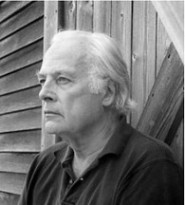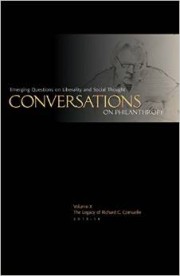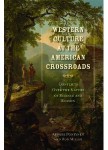By “Simply Staying Possesses All”: Must Freedom and Limits be Opposed?
A century ago, Robert Frost composed the poem Bond and Free.1 The title is fitting for the work, which speaks of the contrast and tension between the fleetingness of Thought and the rooted nature of Love. Thought soars through the heavens and is free; he can escape the harsh realities of this world to seek the heights of knowledge. On the other hand, Love is inherently bound to the beloved and is forced to cling to this world, leaving her imprint and staying in one place.
Thought is more compelling than his opposite, Love, for a majority of the poem. The limitlessness of the intellect appeals to the human spirit, and Frost draws us to prefer this to earth-bound Love, until the end. Just before we arrive at the conclusion, the tone changes. It begins as a soft suggestion and reaches fruition as we are invited to consider that Love is not bound in the way she once seemed, but rather “by simply staying possesses all.” The “all” is obtained through the nature of being still, alongside the necessary relationship with the beloved. This is not possible for Thought, whose promiscuity brings him to constantly move through the Heavens, never ceasing his endless search. Implicit in this dichotomy is the paradox that Love finds her freedom in rootedness itself—in being bonded to the beloved—perhaps by embracing it in a fullness of sense that the fleetingness of Thought cannot achieve. Most importantly, in this possession of the “all,” realized through the beauty of the knowledge of a particular, could lie the true object which Thought is restlessly seeking.
We might see the tension and contrast in Bond and Free as the embodiment of the war between freedom and limits today. Many claim freedom is incompatible with limits—bounds to our desires and actions are inherently contrary to liberty. This thinking champions the pursuit of freedom for its own sake and as an entitlement of man, who is born with free will. Freedom can thus be defined by negation: without any limits. Taking up this freedom, moving upward and beyond where we have been, is always the end of action. The implicit assumption is that an endless pursuit of freedom will always bring us to a better place, and this requires we not be bound in such a way that constrains our ever-expanding freedom.
The limitations of unfreedom must then entail the absence of being bound to something or someone. It would look similar to the way Love clings to the earth and leaves her imprint. “On snow and sand and turf, I see where Love has left a printed trace with straining in the world’s embrace.…” Love toils within the grip of the world and is not free to follow Thought’s path.
And so we encounter a picture of opposites: soaring Thought and bounded Love. Freedom and limits. Winged abandon and chained slavery. Is this contrast right, though?
Thought has a boundless curiosity, and as a result, he always seeks more knowledge. For as long as he can each day, he stays in the heavens, until he is forced to remember that his place is on earth, not among the stars. Hence, would he also admit to a more melancholic side to his fleetingness: that he is never satisfied, and there is something else he is endlessly seeking, never quite finding it? Could it be that Thought cannot be satisfied precisely because his mode of seeking will never encounter its objects on the level that Love possesses, with the security that Love seems to gain through her bondage?
The restlessness and dissatisfaction of Thought certainly seems true of today’s culture, too. Societal and traditional limits have been sacrificed for the sake of being unattached and unbounded. Two of our institutions have suffered the effects of this freedom most gravely: marriage and community. Because we set boundaries to the limits we will accept, marriages are often contingent upon endless gratification and are no longer seen through the lens of permanence. Not at all unconnected, the Burkean “little platoons,” social identity, and tradition have been abandoned for freedom to roam. With that replacement, community has all but vanished. And so modern man has emerged, restless and always roaming, left with only pure and simple freedom.
There is nothing inherently wrong with individual freedom, just as there is nothing wrong with Thought. In fact, both are natural to and crucial for man. For Americans, our love of liberty comes from a recognition of a good and true principle upon which the country was founded: the inviolable dignity and consequent rights of each person. But as with all good things, we must always ask ourselves what freedom’s purpose is. The state of our culture today suggests that perhaps we have missed the mark and ceased to see that the individual freedom we enjoy has a larger purpose; it is not an end unto itself. Thus, when freedom is cleaved from its end, it leaves man in the dissatisfied state—so characteristic of Thought—which appears as a distinct mark of today’s culture. We hunger for community and idolize freedom; we seek intimacy but exhaust our time in things fleeting; we lament the loss of something we cannot describe but refuse to reach for understanding.
Love and her submission to limitation encounter no such difficulties. As Frost first describes Love, the presence of a particular object is implicit. We should note our concept of Love’s embrace requires a particular to imagine it, for Love’s embrace is realized most fully in the essence of another soul. People find fulfillment in particulars. I cannot love generally, I must have an object for my love. This necessity was powerfully articulated in the Brothers Karamazov, when Father Zosima recalls the words of a man: “‘I love mankind,’ he said, ‘but I am amazed at myself: the more I love mankind in general, the less I love people in particular, that is, individually, as separate persons.’”2 We cannot actually love all of mankind’s souls, but rather, the nature of human love requires that particular souls are its object.
In other words, I cannot love humanity in the same way that I love my child. I love this child, friend, spouse. In requiring particular obligations, Love can certainly be seen as limiting. I cannot abandon my child; I cannot be unfaithful to my spouse; I cannot leave my friend in need. If we are to be bound, or truly love, we are no longer wholly our own, and are limited by the beloved. But we may become more whole, able to become the people we ought to be. Relationships shape us through their very limitations; the particularity of people demands a surrender of personal freedom, which, ultimately, should serve to our betterment.
There is no room, of course, for these things, in the path forged by Thought’s “dauntless wings.” Freedom as pursued for its own sake is not able to possess or cherish a particular object. It cannot see the particulars as gainful in themselves—it has eyes only for the unlimitedness before it. But if freedom ought to exist as ordained to a purpose, what is that, and in what context does it appear? It is, most proximately, the family and the community.
We have not always been a whole composed of unattached individuals. The America Tocqueville encountered in the nineteenth century was full of interdependent communities, which speaks to the country’s broader character. He offers us particular insight into the relationship between freedom and limits within these communities: “The township unites two advantages that, everywhere they are found, keenly excite men’s interest; that is to say: independence and power. It acts, it is true, in a circle that it cannot leave, but its movements within that are free.”3 Here we see an image of a limiting power being in place, but within it, genuine freedom, perhaps truer than would have otherwise been present.
The traditional understanding of the community, or City, is as an extension of the bond and mutual dependence existing between family members. Families depend on the duties of their members to function and survive. Because of this, they are able to obtain what they need, both physically and spiritually. Concerning the City, men have always come together for a variety of purposes, the first of which is to “live well,” according to Aristotle. Another word for living well is happiness. This idea of flourishing brings the fullest sense of happiness to living in the communion of a City. Communities exist because men are social animals, and they need this in order to be happy. Just like the family, citizens are bound together by interdependence and, ideally, a mutual esteem for one another and the role each has in the larger whole will be present.
In family and the community, we see the freedom of men ordering themselves to meeting both practical and social needs. This is true firstly on a material level. Survival is only possible immediately through the family, and more remotely (but no less vitally) through cooperation with others within the City. Secondly, if man is by nature a social animal, he fulfills his need for communion with others (and this is a need particular to man) when he operates within the family and City. Outside the family and the City, are others, not ours, and in the very distinction of definition we see that men naturally need the limits inherent in the context of a family and community to form their identities.
If limits exist naturally, and man lives according to these, he will be the most free because he is choosing what is best for his human nature. Freedom, then, is fulfillment of nature; that is, man existing as he is meant to exist as man. And, if he is fulfilling that nature, he will be the happiest. Therefore, Love’s particular freedom and happiness seem interchangeable in this sense. Here we see echoes of the aforementioned line of Frost’s poem: “Yet some say Love by being thrall and simply staying possesses all . . . .” This all is the happiness possessed by Love who has found her freedom in bondage. Thought, by fleeing constantly, cannot hold onto this.
True freedom entails limits, which are necessary to human survival and natural to man. Further, acting within these limits will allow man to be truly happy, which means that he will know Love. And so we may return to our question: are freedom and limits inherently contrary? Our discourse inclines us to answer, no.
Frost beautifully describes Love and Thought as each looking at a different facet of gaining happiness. The last stanza of the poem is especially worth quoting in full:
His [Thought’s] gains in
heaven are what they are.
Yet some say Love by being thrall
And simply staying possesses all
In several beauty that Thought fares far
To find fused in another star.
Love has won happiness—there is beauty in her possession. But we are left with a haunting image of Thought only glimpsing this beauty fused in the stars—he never possesses it.
We should note the distinction that Love does need Thought, she simply doesn’t need Thought’s limitlessness. In fact, Thought aids Love in ensuring she does not lose herself in the beloved. The boundaries of personality are two-sided and limitlessness must be avoided accordingly, whether it be the limitlessness of being unbounded or the limitlessness of sacrifice. We see this in the dangers of excessive love that possesses without bounds and in the excessive gift that puts the receiver in our debt.
Granting this, we must remember that nonetheless, Thought will never satisfy if not pursued for the sake of Love. This is manifest by the nature of human relationships: We can know much about a person without loving them, but we cannot love without knowing the beloved.
We see this reflected similarly in our discussion of freedom and limits. Freedom is vital to man, but it must be used so that we can choose the things best for us as human beings so as to make us happy. We are meant to use our free will to choose to regard our families, live in communities and commit ourselves as individuals and as citizens to lives of virtue and love of one another.
The beauty of Frost’s meditation on the relationship of freedom and limits is that it reflects how the soul should be disposed toward the Divine. We ought to remember that having faith and claiming to love our Creator requires both Thought and Love and also requires limits on our entire lives. Accomplishment, money, power, and knowledge are unsatisfying unless they are pursued for the sake of something more permanent. And yet, even God does not require our love to be exclusive, welcoming even glory reflected by our freedom to love the persons and things of His creation. As Frost brings us to see, limits are not an imposed shackling, but rather a conscious embrace that can help us to possess happiness. If our culture reflected this understanding, perhaps we could be satisfied with all we can possess—that which we can truly call our own. In this we can rest while still being free—the most free of all.
Endnotes
1Edward Connery Lathem, ed., The Poetry of Robert Frost: The Collected Poems, Complete and Unabridged (New York: Henry Holt and Co., 1969).
2 Fyodor Dostoevsky, The Brothers Karamazov, translated by Richard Pevear and Larissa Volokhonsky (New York: Farrar, Straus and Giroux, 2002), 51.
3 Alexis deTocqueville, Democracy in America (Chicago: University of Chicago Press, 2002), 62.






